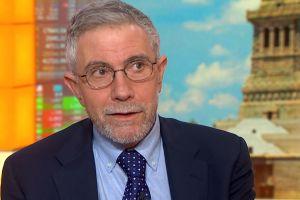When Nobel Winner Asks What Problems Bitcoin Solves…
The internet delivers.

So here’s what happens. Paul Krugman is a big deal in the business world. He’s a Nobel Prize winner in Economics, Distinguished Professor of Economics at the Graduate Center of the City University of New York, and a columnist for The New York Times.
He’s also a crypto skeptic. In his latest column for the New York Times, he argues that cryptocurrency is at least 300 years behind the current, let’s call it traditional monetary system.
He says crypto is too expensive to create, transactions are frictive, costs of doing business are high. On the other hand, conventional money ‘generally does its job very well’, he argues.
“Transaction costs are low. The purchasing power of a dollar a year from now is highly predictable – orders of magnitude more predictable than that of a Bitcoin. Using a bank account means trusting a bank, but by and large banks justify that trust, far more so than the firms that hold cryptocurrency tokens.”
He acknowledges, that he might be wrong and ends his article this way: “If you want to argue that I’m wrong, please answer the question, what problem does cryptocurrency solve? Don’t just try to shout down the skeptics with a mixture of technobabble and libertarian derp.”
The internet replied, in kind.
Truth be told, most of the answers revolved around discrediting Krugman, without really answering the question. Once again, people started pulling out his old predictions, like when he said that the internet’s effect on the economy by 2005 will be no greater than the fax machine’s. (Same argument was used in 2013, when Krugman wrote a piece called “Bitcoin is Evil”. Later, he told Business Insider that “the fact that people are throwing around my 98 quote actually shows that they don’t get this point — that they’re confusing technology with monetary economics.”)
Others were straight-up savage, like this redditor who said:
“That’s a bullish sign, that guy is always wrong,” or one person on Twitter that stated “another old man yells at bitcoin.”
But there were also more concrete answers. Some tried to keep it short and concise, for everyone to understand:
“At the simplest level it solves irreversible value transfer at a distance without a middle man.”
Others have stated that bitcoin can move hundreds of millions of dollars internationally, in under ten minutes, for less than a dollar in fees. “What are the comparable options with the traditional system?” they ask.
“Krugman claims fiat transaction cost are low. In reality the fiat payment systems cost us 2% of GDP, which is quite a huge amount in absolute terms. It makes the economy less efficient, payment cost are friction losses in an economy and eat up profits and revenue. 2% is about two thirds of annual growth rate, so current transaction cost are a real problem. Bitcoin can reduce that by at least one order of magnitude.”
CIO and Managing Partner of BlockTower Capital, a cryptocurrency investment firm, Ari Paul, answered the question on Twitter, saying:
While others suggested that someone has to tell Krugman about non-custodial wallets:
However, Krugman did not elaborate whether those replies answer his question.




